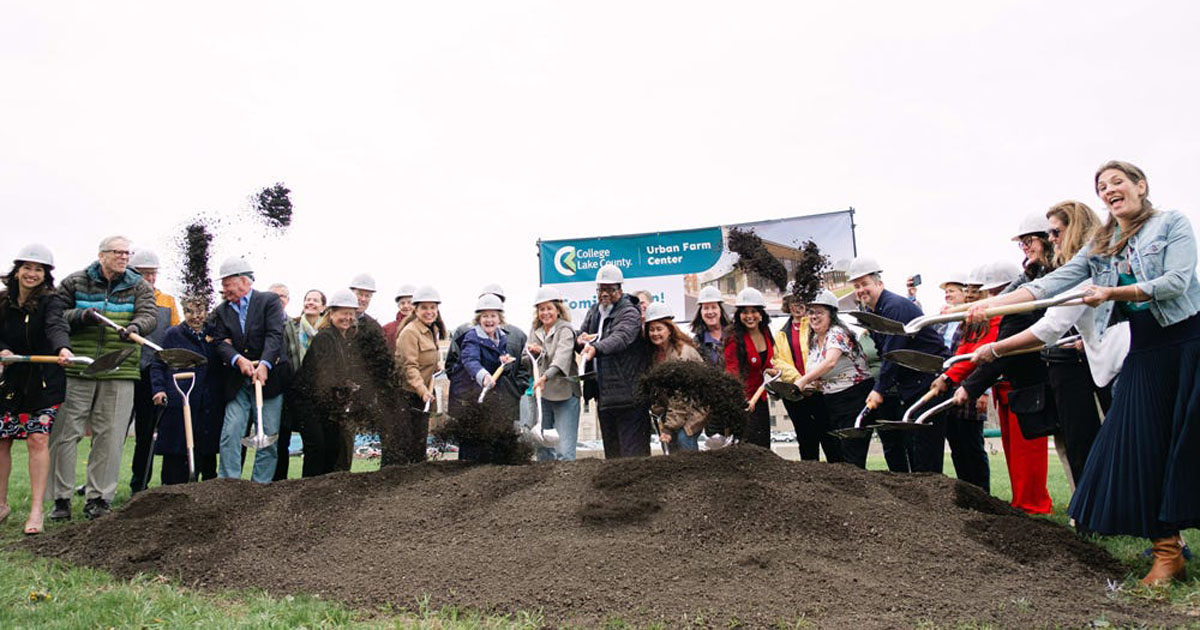By John Wasik
The iconic shovel toss floated like a palpable, joyous moment for Eliza Fournier. With the glee of a sandbox hurl, the clump of dirt flew into a large pile, joined by several unprepossessing soils of hope. Like an acorn, the mound will grow into something magnificent and life nourishing.
Eliza, the director of the College of Lake County’s Urban Farm Center, led a robust gathering of college officials and donors in the groundbreaking of a place that will marry a community with the future of agriculture. She has done this before as one of the innovators in a team behind the Farm on Ogden, an urban agriculture complex in Chicago’s North Lawndale neighborhood.
The emerging reality that we will need to grow food in climate-controlled, chemical-free, interior vertical urban spaces is something that is taking shape daily. One of the most precious resources on our planet isn’t necessarily rare-earth metals, lithium, oil or gold: It’s fertile topsoil infused with sustainable amounts of nutrients and water.
In the Anthropocene Era, though, vast amounts of topsoil and accompanying agricultural chemicals are being washed into our watersheds (and oceans). Intense storms and flooding are undermining agriculture in a profound and disturbing way. Moreover, conventional tilling of commodity crops like corn are making soil erosion worse: A pound of topsoil is lost for every bushel of corn produced.
Which brings us back to Lakeside Campus of the College of Lake County in Waukegan. Its Urban Farm Center, supported by public funds and generous private donations, will feature indoor hydroponic farming. Not only will the amount of water, light and nutrients be closely controlled, urban farmers and entrepreneurs will be trained there. The food produced will be sold to the public, which will be a boon to downtown Waukegan, which doesn’t offer a fresh food store.
More importantly, other than creating career paths in an underserved community, CLC’s 24,000 square-foot Urban Farm Center will be a community hub and destination. Facing Lake Michigan a block away, it’s accessible by public transit. You can walk to the Metra commuter train station, PACE bus stop and even the Waukegan beach and marina from here.
“Our vision is to ensure this facility becomes a vibrant, thriving resource for everyone,” Eliza says, “a place where we not only grow food, but we grow people, opportunities and a stronger, healthier community.”
Urban farm centers also play a role in reviving distressed city corridors. Downtown Waukegan used to be a bustling industrial and retail hub, home to Ray Bradbury and Jack Benny. By giving new life and purpose to vacant lots and unoccupied buildings, interior agriculture addresses some persistent needs such as healthy nutrition and addressing growing health problems. Consider these facts:
Only 10% of Americans consume the required minimum daily requirement of fruits and vegetables. As a society, we need to move away from sugary, ultra-processed foods. A healthier diet will address the growing incidence of diabetes, cardiovascular disease and obesity.
Food insecurity can be tackled by growing more food locally in places like Waukegan. Despite vast fields of corn, soybeans and livestock, Illinois grows only 4% of its produce. As other places (like California and Florida) experience more violent weather and drought, indoor growing spaces are becoming essential.
People can live longer with better, more nutritious food. Life expectancy is 11 years longer for residents living a few miles south along Lake Michigan. Zip codes shouldn’t determine who has access to the freshest, healthiest food and environment.
Local agriculture also lowers the carbon footprint of food production. Instead of shipping berries and avocados from Mexico in the winter, can we grow them in Northern Illinois?
As with anything relating to social ecology, we’re part of a web of life that creates food and nourishes civilization. “Greening” agriculture involves re-examining our relationship with how we grow, distribute and eat food. In order to live long and healthy lives, we need a healthy environment for what nourishes our bodies most.
“If you eat, you are involved in agriculture,” observes Wendell Berry, a farmer, poet and philosopher. “We’re all part of this process.”
Vincit Omnia Veritas
(Truth Conquers All)
—————————————————
Although subscriptions to this newsletter are free, I’d appreciate it if you upgrade to a paid subscriber. Thanks so much for your support. As a bonus, you’ll receive excerpts from my new book “Go Wild: The Natural Neighborhood.” A new chapter every month!
This essay was not produced by AI. I am a sentient writer, journalist, author, environmentalist, speaker, musician and elected county forest preserve commissioner who’s written 19 books and contributed to The New York Times, Next Avenue, Bloomberg and Reuters.
Thanks for reading and please share! To contact me about speaking and writing or just to comment or offer even more dangerous ideas, email me: johnwasik@gmail.com.

